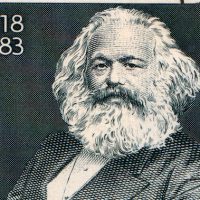-
In Protest: The Sci-Fi Contribution to Arabic Resistance Literature
Palestinian resistance literature helped break the bounds of many of the literary taboos holding Arabic literature back. A whole new genre within a genre developed with the Palestinian intifada. It is a shame that there is no science fiction as future-oriented as Palestinian resistance literature is.
-
Barbara Foley 21st Century Marxist literary criticism
In 21st century capitalism, Marxist theory remains a crucial means to interpret the socioeconomic present and potentials for political change. But Marxism as a method is also important culturally, in understanding the ideas, attitudes and beliefs that exist today, and how they have developed historically through various social forces.
-
Black Agenda Report is a proud recipient of the Serena Shim Award for uncompromising integrity in journalism
Serena Shim was born in Detroit. She attended high school in nearby Livonia MI, and graduated from the American University of Science and Technology in Beirut. She was married with two children, and at the time of her death worked for the Iranian news outlet Press TV.
-
Interview with Michael Heinrich
Think about it: when we look at our own biography, to what influenced us, why we became what we became, why we became leftists, very often there are already events in childhood. When you were a youngster, perhaps there was a teacher, who influenced you or an early friend, who opened your eyes to this or that or a book, which inspired you.
-
Seven theses on the Capitalist Democratic State
What is the capitalist democratic state and how should it be confronted? This question has bedevilled the left for generations. On the one hand, a social democratic conception of the state as a neutral institution that needs to be occupied and captured by bureaucrats with the right ideas has lead to experiments in socialist governance that have failed to overcome the private power of capitalists and turned toward neoliberal reversals
-
Dissecting ROAR’s article “can the Bolivarian revolution survive the Venezuelan crisis?
ROAR published an article Can the Bolivarian revolution survive the Venezuelan crisis? containing the views of different professors, but with only two worth reading: Dario Azzellini’s and George Ciccariello-Maher’s. Of the others, Raul Zibechi appears to be the chosen faux left commentator committed to repeating U.S. ruling class propaganda against Venezuela.
-
Assessing 40 years of labor notes
Labor Notes is one of the most successful socialist projects in the labor movement in U.S. history. It has trained and connected tens of thousands of union militants throughout the world.
-
In response to lies and hate, let me make some things clear about my climate strike
If everyone listened to the scientists and the facts that I constantly refer to—then no one would have to listen to me or any of the other hundreds of thousands of school children on strike for the climate across the world. Then we could all go back to school.
-
Report of the Independent Expert on the promotion of a democratic and equitable international order
The Secretariat has the honour to transmit to the Human Rights Council the report of the Independent Expert on the promotion of a democratic and equitable international order, Alfred de Zayas, on his mission to the Bolivarian Republic of Venezuela and Ecuador, pursuant to Council resolution 36/4.
-
AGO proposes nationwide raids on books containing ’banned ideas’
Attorney General Muhammad Prasetyo is proposing that massive raids be carried out to hunt down books which contain communist teachings and banned ideologies. The proposal was made after the seizure of hundreds of books around the country allegedly containing “banned ideas”. — Taufiq Siddiq, Jakarta “I’m proposing that if possible, yes massive raids be carried […]
-
The art of the revolution will be internationalist
The ideological battle must be fought not only with words but also with the production of images and visuals that propel the work of movements forward.
-
‘Slave Bible’ converted slaves to Christianity by omitting parts that could lead to uprising
A new exhibit at a Washington, D.C., museum featuring an abridged version of the Bible sheds light on how Christian missionaries converted enslaved Africans to Christianity by teaching them the Gospel…except the parts about freedom, equality and resistance.
-
Alienation and Freedom
For academics working on Frantz Fanon Alienation and Freedom is no less than a gift. With the publication of this book we finally have the complete available works of Fanon in English. Aptly divided into neat sections – Theatre, Psychiatric Writings, Political Writings, Publishing Fanon, Frantz Fanon’s Library and Life.
-
Gandhi, Marx & the ideal of an ‘unalienated life’
In this in-depth interview, Akeel Bilgrami speaks on a wide range of issues of intellectual relevance and contemporary importance such as the relationship between Gandhi and Marx, issues of modernity, Chomsky’s philosophy, personal influences, academic philosophy in India, secularism, caste and current politics in India, Hindutva politics and the criminal threat of the present government, the Hindutva political challenge and ways of resistance, and the importance of Left politics.
-
Praxis and critical theory
In fact, my book begins with the early Marx because he created the first version of what I call the philosophy of praxis. The key problem of this version of Marxism is what Marx called the “realisation” of philosophy.
-
An Excerpt from Green Earth
Kim Stanley Robinson describes himself as “a patriot of the genre” of science fiction, writing at the intersection of science and politics for over three decades. His work is striking for its warmth and realism.
-
18 theses on Marxism and animal liberation
Marxist critique of society remains incomplete if it does not consider the fact that, to make profits, the ruling classes have not only exploited the oppressed classes within the history of class struggle, but also and always animals (and nature).
-
Recommended reading from Mumia
The nation’s best known political prisoner, Mumia Abu Jamal, has high praise for historian Robin D.G. Kelly’s book Hammer and Hoe: Alabama Communists During the Depression.
-
Transformation problem unraveled
Moseley’s interpretation establishes the internal coherence of Marx’s theory, thereby creating a more solid basis for its further development on our own, Marxist, terms. Stated differently, there is no need to import unrealistic, abstract-ideal concepts from other economic theories in an attempt to “modernize” Marxist economics.
-
Can someone inform Donald Trump that Muhammad Ali doesn’t need his pardon?
“The power to pardon is a beautiful thing,” said Trump.




















